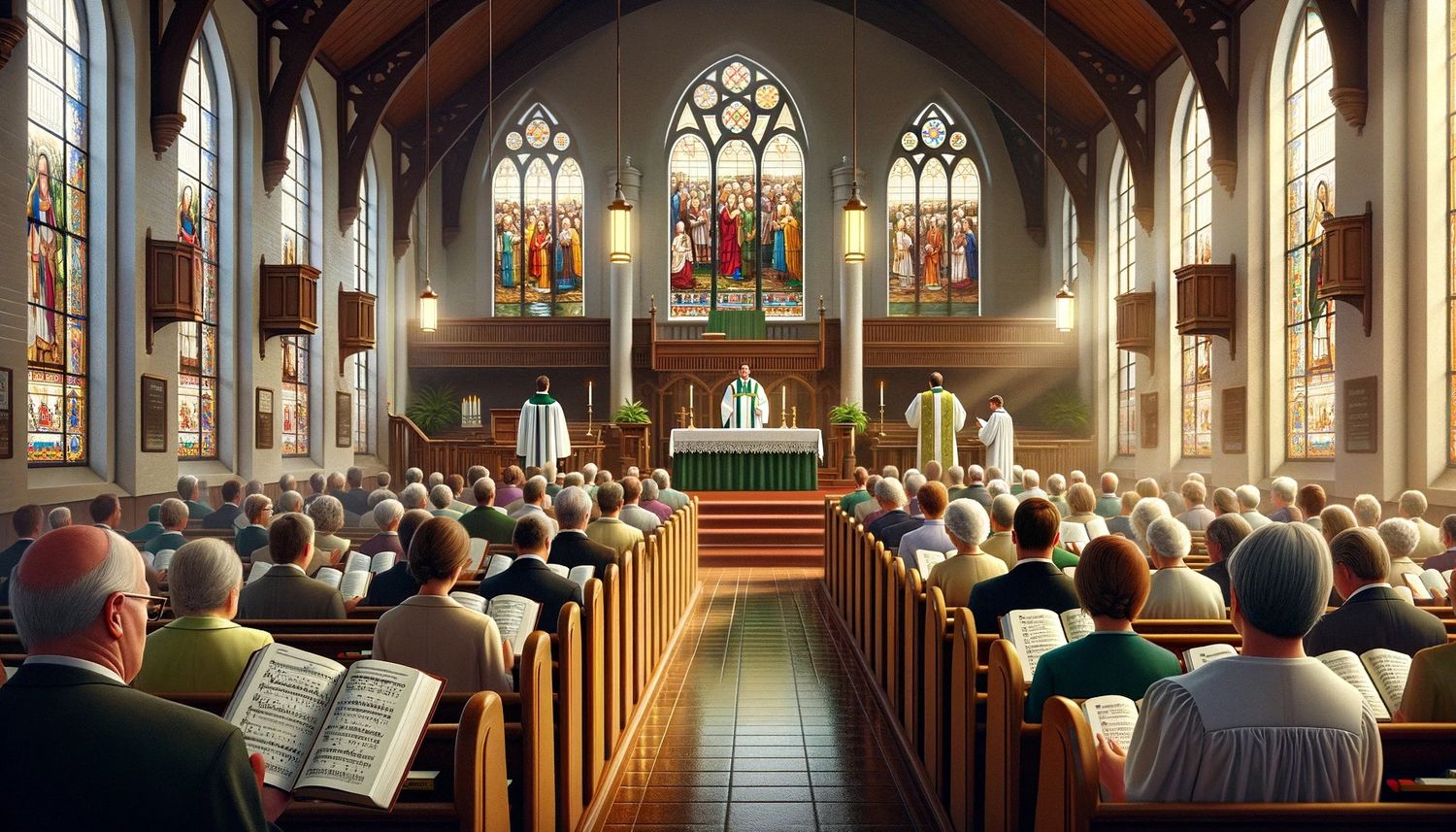Home>Theology and Spirituality>What Makes A Lutheran A Lutheran


Theology and Spirituality
What Makes A Lutheran A Lutheran
Published: March 3, 2024
Jason DeRose, Managing Editor at Christian.net, uses his expertise in religion and journalism to deepen understanding of faith's societal impacts. His editorial leadership, coupled with a strong academic background, enriches the platform’s diverse content, earning him recognition in both journalism and religious circles.
Discover the essence of Lutheran theology and spirituality in this insightful exploration of what defines a Lutheran. Explore the core beliefs and practices that shape the Lutheran faith.
(Many of the links in this article redirect to a specific reviewed product. Your purchase of these products through affiliate links helps to generate commission for Christian.net, at no extra cost. Learn more)
Table of Contents
The History of Lutheranism
The history of Lutheranism dates back to the 16th century when a German monk named Martin Luther challenged the teachings and practices of the Roman Catholic Church. Luther's actions sparked the Protestant Reformation, a movement that sought to reform the Catholic Church and ultimately led to the creation of various Protestant denominations, including Lutheranism. Luther's criticisms of the Church's sale of indulgences and other practices led to his excommunication, but his ideas found widespread support among the German people and beyond. This marked the beginning of Lutheranism as a distinct Christian tradition.
-
The Ninety-Five Theses: In 1517, Martin Luther famously nailed his Ninety-Five Theses to the door of the Castle Church in Wittenberg, Germany. This document outlined his objections to the sale of indulgences and other corrupt practices within the Catholic Church. The widespread distribution of the Theses due to the recent invention of the printing press helped to spread Luther's ideas throughout Europe.
-
The Augsburg Confession: In 1530, Lutheran leaders presented the Augsburg Confession to the Holy Roman Emperor, Charles V. This document outlined the key beliefs of the Lutheran movement and sought to demonstrate that these beliefs were in line with Scripture and early Christian teachings. The Augsburg Confession remains a foundational document for Lutherans to this day.
-
The Spread of Lutheranism: Lutheranism quickly gained followers throughout Germany and Scandinavia, and it also found a foothold in other parts of Europe. The movement was supported by secular rulers who saw in Lutheranism an opportunity to challenge the authority of the Catholic Church and assert their own independence.
-
The Formation of Lutheran Churches: As Lutheranism continued to grow, various regional and national churches were established, each with its own unique traditions and practices. These churches were united by their adherence to the teachings of Martin Luther and the principles outlined in the Augsburg Confession.
-
The Peace of Augsburg: In 1555, the Peace of Augsburg officially recognized Lutheranism as a legitimate alternative to Catholicism within the Holy Roman Empire. This agreement granted rulers the authority to choose the religion of their territories, leading to a formal division between Catholic and Lutheran regions.
The history of Lutheranism is a story of religious upheaval, theological debate, and the establishment of a distinct Christian tradition that continues to thrive to this day. Martin Luther's bold stand against the practices of the Catholic Church set in motion a series of events that would forever change the religious landscape of Europe and beyond.
Read more: What Is A Lutheran
The Core Beliefs of Lutheranism
-
Justification by Faith: Lutherans believe that individuals are justified, or made right with God, through faith alone. This core belief emphasizes that salvation is a gift from God, received through trust in the promises of Christ, rather than through good works or human effort.
-
The Authority of Scripture: Lutherans hold the Bible as the ultimate authority for faith and life. They believe that the Scriptures are the inspired and inerrant Word of God, and that they contain all that is necessary for salvation and Christian living.
-
The Priesthood of All Believers: Lutheranism teaches that all baptized Christians share in the priesthood of Christ. This means that every believer has direct access to God and is called to serve others in love and faith.
-
The Theology of the Cross: Lutherans emphasize the centrality of Christ's crucifixion as the means of God's redemption. They believe that God's power is revealed in weakness and suffering, and that the cross is the ultimate demonstration of God's love for humanity.
-
The Sacraments: Lutherans recognize two sacraments, Baptism and the Lord's Supper (Holy Communion), as means of God's grace. They believe that in these sacraments, God offers forgiveness, renewal, and spiritual nourishment to believers.
-
The Doctrine of Vocation: Lutherans emphasize the idea that all callings and occupations are avenues through which God works in the world. They believe that every vocation, whether as a parent, worker, or citizen, is a way to serve God and neighbor.
-
The Two Kingdoms: Lutherans distinguish between the kingdom of God, which operates through the proclamation of the Gospel, and the earthly kingdom, which is concerned with temporal matters and the well-being of society. This concept shapes their understanding of the Christian's role in the world.
These core beliefs form the foundation of Lutheranism and shape the way Lutherans understand God, salvation, the Christian life, and the world. They reflect the teachings of Martin Luther and continue to guide the faith and practice of Lutheran communities around the globe.
The Sacraments in Lutheranism
Lutherans recognize two sacraments as instituted by Christ Himself: Baptism and the Lord's Supper (Holy Communion). These sacraments are seen as visible signs of God's invisible grace and serve as a means through which God offers forgiveness, renewal, and spiritual nourishment to believers.
-
Baptism: In Lutheranism, Baptism is considered a sacrament of initiation into the Christian faith. It is seen as a means through which God adopts individuals into His family, the Church, and bestows the gift of the Holy Spirit. Lutherans believe that through Baptism, a person is united with Christ in His death and resurrection, and is granted the assurance of salvation. This sacrament is often administered to both infants and adults, and it is accompanied by the promise of God's grace and forgiveness.
-
The Lord's Supper (Holy Communion): The Eucharist, or Holy Communion, holds a central place in Lutheran worship and theology. Lutherans believe in the real presence of Christ in the bread and wine, though they do not adhere to the Roman Catholic doctrine of transubstantiation. Instead, they hold to the belief in the sacramental union, in which the body and blood of Christ are truly present "in, with, and under" the elements of bread and wine. Through the reception of the Lord's Supper, believers receive the forgiveness of sins, the strengthening of faith, and the assurance of God's love and grace.
The sacraments in Lutheranism are not viewed as mere symbols or rituals, but as powerful means of grace through which God actively works in the lives of believers. They serve to nourish and sustain the faith of the Christian community, and they are celebrated with reverence and joy as tangible expressions of God's love and mercy.
The Role of Scripture in Lutheranism
Lutherans hold a high view of the Bible, considering it to be the ultimate authority for matters of faith and life. The Scriptures are seen as the inspired and inerrant Word of God, containing all that is necessary for salvation and Christian living. This belief is rooted in the teachings of Martin Luther, who emphasized the importance of Scripture in shaping Christian doctrine and practice.
Sola Scriptura
Central to the role of Scripture in Lutheranism is the principle of Sola Scriptura, which means "Scripture alone." This principle asserts that the Bible is the sole source of divine revelation and the only infallible guide for faith and practice. Lutherans believe that the Scriptures are clear and sufficient in conveying God's will for humanity, and they reject the idea that tradition or human authorities hold equal or greater authority than the Word of God.
Read more: What Is The Lutheran Church
The Authority of the Word
Lutherans affirm the authority of the Word of God as the standard by which all teachings and traditions are to be evaluated. They emphasize the need for the Scriptures to be faithfully interpreted and proclaimed within the Christian community, guiding believers in their understanding of God's will and nurturing their faith.
The Study and Preaching of Scripture
The study and preaching of Scripture hold a central place in Lutheran worship and theological education. Lutherans place a strong emphasis on the regular reading and exposition of the Bible in both public worship and private devotion. The sermon, based on the biblical text, is a key component of Lutheran worship services, providing an opportunity for the congregation to hear and respond to the Word of God.
The Reformation Principle
The role of Scripture in Lutheranism is closely tied to the legacy of the Protestant Reformation. Martin Luther's translation of the Bible into the vernacular language made the Scriptures more accessible to the common people, encouraging personal study and reflection on the Word of God. This emphasis on the direct encounter with the Bible continues to shape the faith and practice of Lutherans today.
The Living Word
For Lutherans, the Scriptures are not merely a historical record or a collection of moral teachings, but a living and active Word that continues to speak to believers today. They believe that through the Scriptures, God reveals His will, His promises, and His saving work in Christ, inviting all people into a transformative relationship with Him.
The role of Scripture in Lutheranism is foundational to the identity and theology of Lutheran churches worldwide. It shapes their understanding of God, the Christian life, and the mission of the Church, serving as a source of guidance, comfort, and inspiration for all who seek to follow Christ.
Read more: What Is Apostolic Lutheran
The Importance of Grace in Lutheranism
Grace holds a central and foundational role in the theology of Lutheranism. Lutherans believe in the concept of "sola gratia," which means "grace alone." This principle emphasizes that salvation is entirely a result of God's grace, freely given to humanity apart from any merit or worthiness on their part. The importance of grace in Lutheranism is rooted in the teachings of Martin Luther, who experienced a profound spiritual awakening regarding the nature of God's grace and its transformative power in the life of believers.
Unmerited Favor
Lutherans affirm that God's grace is unmerited favor, undeserved and freely given to all people. They emphasize that no one can earn or deserve God's grace through their own efforts or good works. Instead, grace is a gift bestowed by God out of His boundless love and mercy for humanity.
Justification by Grace through Faith
Central to the Lutheran understanding of grace is the doctrine of justification by grace through faith. Lutherans believe that individuals are justified, or made right with God, solely by His grace, received through faith in the promises of Christ. This means that salvation is not based on human achievement, but on the gracious work of God in Christ, which is apprehended by trust in His redemptive work.
Transforming Power
Lutherans emphasize that God's grace has the power to transform and renew the lives of believers. They believe that through the working of the Holy Spirit, God's grace brings about spiritual rebirth, empowers believers to live a life of faith and obedience, and sustains them in times of trial and temptation.
Read more: What Is Wrong With Lutheran
Assurance and Comfort
The importance of grace in Lutheranism also extends to the assurance and comfort it provides to believers. Lutherans find solace in the unchanging nature of God's grace, knowing that it is not dependent on their fluctuating emotions or circumstances. They take comfort in the certainty that God's grace is sufficient to cover their sins and shortcomings, and that nothing can separate them from the love of God in Christ.
The Means of Grace
Lutherans recognize the sacraments, particularly Baptism and the Lord's Supper, as tangible expressions of God's grace. They believe that in these sacraments, God offers forgiveness, renewal, and spiritual nourishment to believers, strengthening their faith and uniting them with Christ and His Church.
A Life of Gratitude
The importance of grace in Lutheranism leads to a life of gratitude and thanksgiving. Lutherans are called to respond to God's grace with acts of love and service to others, recognizing that their good works are a response to the grace they have received, rather than a means of earning God's favor.
The concept of grace in Lutheranism is a profound and transformative reality that shapes the faith, worship, and mission of Lutheran churches worldwide. It serves as a constant reminder of God's unmerited love and favor toward humanity, inviting all people to embrace the abundant and life-giving grace offered through Jesus Christ.
The Structure of the Lutheran Church
The structure of the Lutheran Church is characterized by its emphasis on the priesthood of all believers and its commitment to congregational autonomy within a larger framework of regional and national church bodies. While there is diversity in the organizational structure of Lutheran churches around the world, certain key elements are commonly found within the structure of the Lutheran Church.
Read more: What Is A Lutheran Hymn
Congregational Autonomy
Lutherans uphold the principle of congregational autonomy, which grants individual congregations a significant degree of self-governance in matters of worship, administration, and mission. Each congregation is typically led by a pastor and a council or board of elected members who oversee the spiritual and practical affairs of the church. This emphasis on local autonomy allows for flexibility and adaptability in responding to the unique needs and contexts of each congregation.
Synodical and Regional Bodies
At a regional and national level, Lutheran churches are often organized into synods or dioceses, which serve as intermediary bodies that provide support, oversight, and coordination for congregations within a specific geographic area. These synodical structures may vary in their level of authority and decision-making power, but they generally exist to facilitate cooperation, resource-sharing, and mutual accountability among member congregations.
The Role of the Pastor
The pastor plays a central role in the structure of the Lutheran Church, serving as the spiritual leader and shepherd of the congregation. In addition to preaching and administering the sacraments, the pastor often provides pastoral care, guidance, and teaching to the members of the church. The pastor may also participate in the broader governance and decision-making processes of the regional or national church body.
Church Councils and Assemblies
Lutheran churches often have representative bodies, such as church councils or assemblies, composed of clergy and lay members, that are responsible for making decisions on behalf of the larger church body. These councils may address theological, administrative, and disciplinary matters, and they may also be involved in the selection and oversight of pastors, the establishment of doctrinal statements, and the allocation of resources for mission and ministry.
Read more: What Is A Vicar In The Lutheran Church?
Ecumenical Relationships
Many Lutheran churches are engaged in ecumenical relationships with other Christian denominations, seeking to foster unity and cooperation across different traditions. These relationships may involve formal agreements, joint worship services, theological dialogues, and collaborative efforts in areas such as social justice, humanitarian aid, and interfaith dialogue.
Educational and Seminary Institutions
Lutheran churches often have educational and seminary institutions that are dedicated to the training and equipping of clergy, church workers, and lay leaders. These institutions play a vital role in nurturing theological education, spiritual formation, and the development of leadership skills within the church.
Mission and Outreach
The structure of the Lutheran Church is oriented toward mission and outreach, with a focus on sharing the Gospel, serving the community, and engaging in global mission efforts. Lutheran churches may support missionary work, social service programs, and evangelistic initiatives, both locally and internationally, as part of their commitment to spreading the message of God's love and grace.
The structure of the Lutheran Church reflects a balance between local autonomy and connectionalism, allowing for a diversity of expressions and practices within a shared theological and ecclesial framework. This structure is designed to support the mission and ministry of the church, while also fostering a sense of unity, accountability, and mutual support among congregations and church bodies.
The Influence of Martin Luther
Martin Luther's influence on the development of Lutheranism and the broader Protestant Reformation cannot be overstated. His actions, writings, and theological insights have left an indelible mark on the history of Christianity and continue to shape the beliefs and practices of Lutheran churches worldwide.
Read more: What Is Advent In Lutheran Church
The Reformation Movement
Martin Luther's bold challenge to the teachings and practices of the Roman Catholic Church sparked the Protestant Reformation, a movement that sought to reform the Church and restore the authority of the Scriptures. Luther's Ninety-Five Theses, which he nailed to the door of the Castle Church in Wittenberg, Germany, served as a catalyst for widespread debate and reflection on the nature of salvation, the role of the Church, and the authority of tradition. This movement led to the establishment of various Protestant denominations, with Lutheranism being one of the most significant outcomes of Luther's influence.
The Translation of the Bible
One of Luther's most enduring contributions was his translation of the Bible into the vernacular German language. This monumental task made the Scriptures more accessible to the common people, enabling them to read and study the Word of God in their own language. This emphasis on the direct encounter with the Bible had a profound impact on the spiritual and intellectual life of the German-speaking population and contributed to the spread of the Reformation throughout Europe.
The Augsburg Confession
Luther's influence is also evident in the Augsburg Confession, a foundational document of Lutheranism. This confession of faith, presented to the Holy Roman Emperor in 1530, outlined the key beliefs of the Lutheran movement and sought to demonstrate their alignment with Scripture and early Christian teachings. The Augsburg Confession remains a central doctrinal statement for Lutherans, reflecting Luther's theological insights and shaping the identity of Lutheran churches.
The Theology of Grace
Luther's emphasis on the primacy of grace in the Christian life has had a lasting impact on Lutheran theology. His teachings on justification by grace through faith alone, the priesthood of all believers, and the sufficiency of Scripture as the ultimate authority for faith and life continue to inform the core beliefs of Lutheranism. Luther's understanding of grace as unmerited favor, freely given by God, has become a defining feature of Lutheran theology and spirituality.
Read more: What Is A Synod In The Lutheran Church
The Legacy of Reform
Martin Luther's influence extends beyond the theological realm and into the social, cultural, and political spheres. His advocacy for the reform of church practices, his critique of social injustices, and his commitment to the education of the common people have left a lasting legacy. Luther's impact on the development of education, music, and the German language, as well as his role in shaping the political landscape of his time, demonstrate the breadth and depth of his influence.
The Continuing Relevance
The influence of Martin Luther continues to be felt in the ongoing dialogue between Lutheran churches and other Christian traditions. His legacy serves as a point of reference for discussions on theological, ecclesial, and ethical matters, and his writings remain a vital resource for the study and interpretation of Scripture. Luther's commitment to the proclamation of the Gospel, his emphasis on the centrality of Christ, and his unwavering trust in the grace of God continue to inspire and guide the faith and witness of Lutheran communities around the world.
Martin Luther's influence on Lutheranism and the broader Christian tradition is a testament to the enduring impact of his life and work. His legacy serves as a source of inspiration, challenge, and reflection for all who seek to understand and embody the principles of the Reformation in the contemporary context.








